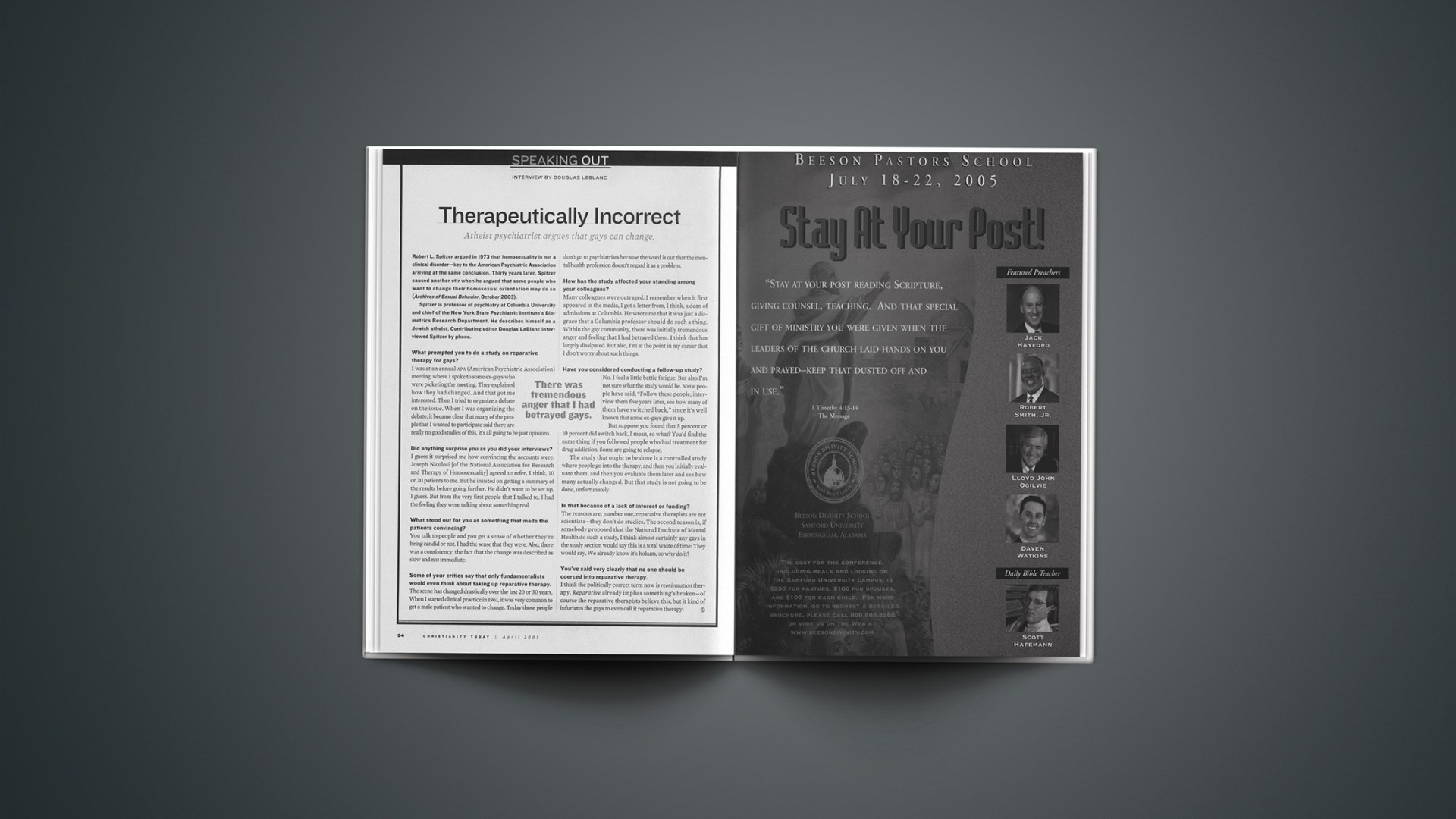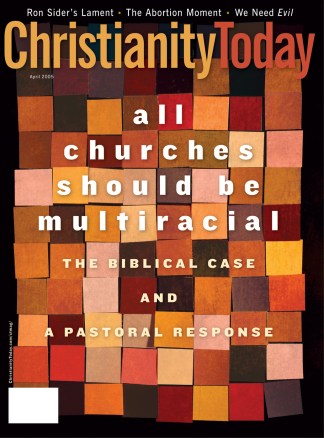Robert L. Spitzer argued in 1973 that homosexuality is not a clinical disorder—key to the American Psychiatric Association arriving at the same conclusion. Thirty years later, Spitzer caused another stir when he argued that some people who want to change their homosexual orientation may do so (Archives of Sexual Behavior, October 2003).
Spitzer is professor of psychiatry at Columbia University and chief of the New York State Psychiatric Institute’s Biometrics Research Department. He describes himself as a Jewish atheist. Contributing editor Douglas LeBlanc interviewed Spitzer by phone.
What prompted you to do a study on reparative therapy for gays?
I was at an annual APA (American Psychiatric Association) meeting, where I spoke to some ex-gays who were picketing the meeting. They explained how they had changed. And that got me interested. Then I tried to organize a debate on the issue. When I was organizing the debate, it became clear that many of the people that I wanted to participate said there are really no good studies of this, it’s all going to be just opinions.
Did anything surprise you as you did your interviews?
I guess it surprised me how convincing the accounts were. Joseph Nicolosi [of the National Association for Research and Therapy of Homosexuality] agreed to refer, I think, 10 or 20 patients to me. But he insisted on getting a summary of the results before going further. He didn’t want to be set up, I guess. But from the very first people that I talked to, I had the feeling they were talking about something real.
What stood out for you as something that made the patients convincing?
You talk to people and you get a sense of whether they’re being candid or not. I had the sense that they were. Also, there was a consistency, the fact that the change was described as slow and not immediate.
Some of your critics say that only fundamentalists would even think about taking up reparative therapy.
The scene has changed drastically over the last 20 or 30 years. When I started clinical practice in 1961, it was very common to get a male patient who wanted to change. Today those people don’t go to psychiatrists because the word is out that the mental health profession doesn’t regard it as a problem.
How has the study affected your standing among your colleagues?
Many colleagues were outraged. I remember when it first appeared in the media, I got a letter from, I think, a dean of admissions at Columbia. He wrote me that it was just a disgrace that a Columbia professor should do such a thing. Within the gay community, there was initially tremendous anger and feeling that I had betrayed them. I think that has largely dissipated. But also, I’m at the point in my career that I don’t worry about such things.
Have you considered conducting a follow-up study?
No. I feel a little battle fatigue. But also I’m not sure what the study would be. Some people have said, “Follow these people, interview them five years later, see how many of them have switched back,” since it’s well known that some ex-gays give it up.
But suppose you found that 5 percent or 10 percent did switch back. I mean, so what? You’d find the same thing if you followed people who had treatment for drug addiction. Some are going to relapse.
The study that ought to be done is a controlled study where people go into the therapy, and then you initially evaluate them, and then you evaluate them later and see how many actually changed. But that study is not going to be done, unfortunately.
Is that because of a lack of interest or funding?
The reasons are, number one, reparative therapists are not scientists—they don’t do studies. The second reason is, if somebody proposed that the National Institute of Mental Health do such a study, I think almost certainly any gays in the study section would say this is a total waste of time: They would say, We already know it’s hokum, so why do it?
You’ve said very clearly that no one should be coerced into reparative therapy.
I think the politically correct term now is reorientation therapy. Reparative already implies something’s broken—of course the reparative therapists believe this, but it kind of infuriates the gays to even call it reparative therapy.
Copyright © 2005 Christianity Today. Click for reprint information.
Related Elsewhere:
An abstract of Spitzer’s study is available from the Archives of Sexual Behavior. The full study is available for a fee.
The National Association for Research & Therapy of Homosexuality has a review of the study.
Recent articles by homosexuals who have changed include:
Cheated by the Affirming Church | Contrary to what some churches teach, it is homosexuality—and not its suppression—that enslaves people like me. (Feb. 17, 2005)
My Path to Lesbianism | It was hatred of women that drove me there, and Christ in community that led me out. (Feb. 17, 2005)
Other Christianity Today articles on homosexuality and sexuality include:
Thirteen Bad Arguments for Same-Sex Marriage | Why the rhetoric doesn’t stand up under scrutiny. (Aug. 26, 2004)
Why Gay Marriage Would Be Harmful | Institutionalizing homosexual marriage would be bad for marriage, bad for children, and bad for society. (Feb. 19, 2004)
‘Get Mine, Get Yours’ | Sexual swagger and slang do not mask a generation’s loneliness. (May 07, 2003)
Stretch Pants, Beer, and Other Controversies | A New Testament professor discerns the relative from the timeless in biblical texts on slaves, women, and homosexuals. (July 08, 2002)
No Easy Victory | A plea from a Christian husband and father who, day by day, resists his homosexual desires. (March 08, 2002)
Ex-Gay Sheds the Mocking Quote Marks | The retiring head of Exodus says gay transformation ministries are more respected and effective than ever. (January 7, 2002)
Walking in the Truth | Winning arguments at church conventions is not enough without compassion for homosexuals. (Sept. 4, 2000)
Building a Bridge | A gay journalist and evangelical pastor correct their mutual misperceptions. (July 13, 2000)
The Jerry We Never Knew | He hangs out with liberal pundits and gay activists. Is this the same Jerry Falwell who founded the Moral Majority? (May 2, 2000)
Sex and Saints | A new vocabulary for an oversexualized culture. (Apr. 3, 2000)
Building outreach and friendship with the homosexual community | What Jerry Falwell really said at the Anti-Violence Forum. (Nov. 5, 1999)
Just Saying ‘No’ Is Not Enough | How should Christians address homosexuality? (Oct. 4, 1999)










